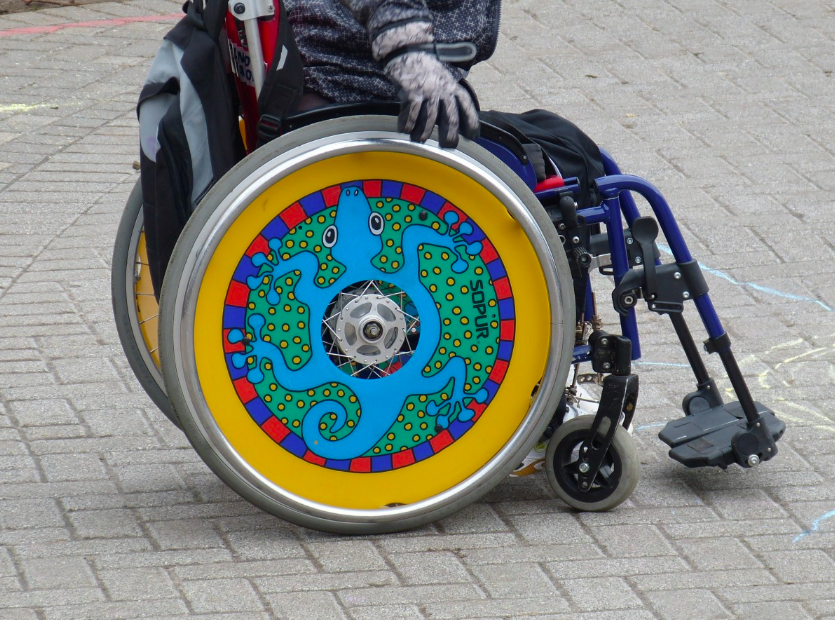During the Jim Crow era, Black travelers might turn to The Negro Motorist Green Book for tips about lodgings, gas stations and other businesses that were accessible to them.
The Civil Rights Act of 1964 outlawed the type of racial discrimination that made the Green Book necessary, and publication ceased in 1966. The Americans with Disabilities Act (ADA) was signed into law in 1990, prohibiting “discrimination against individuals with disabilities in all areas of public life, including jobs, schools, transportation, and all public and private places that are open to the general public.” It made sweeping changes at every level of government and for businesses throughout the nation.
Sites like AccessNow, WheelChairJimmy, AXSMap, WheelchairTravel.org and Unlock Philly, despite their limited resources, are still critical to many people with disabilities who are navigating mass transit or the routine tasks of getting food or a hotel room in an unfamiliar city.
Racial discrimination is still heavily an issue in America, but compliance with anti-discrimination laws in public accommodations is at least far better now than in the 1960s. Meanwhile, Philadelphia, which has the highest disability rate of large US cities, has a wildly understaffed office in its Mayor’s Commission on Disabilities and a host of sidewalks that one wouldn’t consider wheelchair-friendly.
In 2017, the US Department of Justice still had to reach agreements with 12 of Philadelphia’s most popular restaurants so they complied with ADA guidelines.
Needless to say, the process has been gradual.
“Disability rights movement is in the midst of growing pains,” said Vicki Landers, who is the president and director of Disability Pride Philadelphia. “Growing pains are not always bad, [it’s just that] our community is becoming more engaged in all aspects of life that affects us.”
Landers works year-round on issues of accessibility and is an advocate for proper legislation. She readily believes disability history and sexual health should be a standard part of K-12 education while normalizing disability and adding to the forward momentum of the civil rights movement.
Aside from the need to increase access across Philadelphia venues, ensuring curb cut compliance and improving transportation, Landers says there are also significant issues with long term housing, food, education, attendant care and other major matters of survival.
That’s all in the works this month as she and her community are taking the opportunity to celebrate.
Beginning June 10, Philadelphia will celebrate the annual Disability Pride and Celebration Week, a near week-long affair (June 10-15) promoting visibility and positivity for people with disabilities. Included among the events are a flag raising kick off, happy hour, movies, panels, live theater experiences and a final pride parade celebration on Saturday, June 15.
“Disability Pride Week gives our families, friends, allies, organizations and people living with disabilities an opportunity to socialize and celebrate with friends, make new friends, and celebrate the awesomeness of our community,” says Landers, who lives in the Cecil B. Moore section of North Philadelphia. “In addition, we want to give our community the availability to learn about services, and new, innovative things happening in our immediate area and around the world.”
According to the Disability Pride Philadelphia website, the parade “[seeks] to change the way people think about and define disability, to end the stigma of disability, and to promote the belief that disability is a natural and beautiful part of human diversity in which people living with disabilities can take pride.”
The first Disability Pride Day was held in Boston in 1990, in honor of the ADA signing. The parade element made its debut at a Disability Pride event held in Chicago in 2004. Philadelphia was the fourth U.S. city to host a parade in 2012, and one of only 15 cities in the country that hosts the event.
Given the limited accessibility of the city, the logistics of putting on this series of events seems a daunting challenge. Landers acknowledges it can be difficult, especially with little institutional support, saying, “For all events, you must be engaged and have an understanding about the entire community you are planning for.”
To make it happen, Disability Pride has multiple committees, she says, covering everything from fundraising and booking performers to marketing and logistics of accessibility. Someone has to visit each venue to evaluate things like ADA compliance in entrances, seating, bathrooms, accommodations for interpreters and adjustable sound volumes, among other things. “We also want to make sure everything is free, except Happy Hour, so that everyone can participate regardless of socioeconomic status,” she added.
While the events have a lot to offer folks with disabilities and those close to them, Landers thinks it’s important for everyone to be aware of the myths surrounding disability and the realities of what it’s like to be disabled.
“People with disabilities are so much more than a medical diagnosis; it’s a culture and a hugely intersectional community,” she said, adding, “If you are not living with a disability in this very moment as you read these words – that could change [in] seconds. Disability Pride Philadelphia and our allies are fighting to make Philadelphia and the world accessible because we are living with disabilities today, and when individuals become a part of our community we want it to be without difficulties. We want access to be normalcy, not accommodation.”
TWITTER: @TIMAREE_LEIGH





